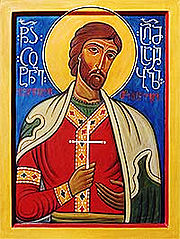
Tsotne Dadiani
Encyclopedia

Georgia (country)
Georgia is a sovereign state in the Caucasus region of Eurasia. Located at the crossroads of Western Asia and Eastern Europe, it is bounded to the west by the Black Sea, to the north by Russia, to the southwest by Turkey, to the south by Armenia, and to the southeast by Azerbaijan. The capital of...
nobleman of whom the medieval Georgian Chronicles relate a story of how Tsotne’s self-sacrificing move saved his associates from the Mongol
Mongol Empire
The Mongol Empire , initially named as Greater Mongol State was a great empire during the 13th and 14th centuries...
captivity and imminent death, and which made him into one of the most popular historical figures in Georgia and a saint
Saint
A saint is a holy person. In various religions, saints are people who are believed to have exceptional holiness.In Christian usage, "saint" refers to any believer who is "in Christ", and in whom Christ dwells, whether in heaven or in earth...
of the Georgian Orthodox Church.
Tsotne was the son of Shergil, the great noble of western Georgia and the duke
Eristavi
Eristavi was a Georgian feudal office, roughly equivalent to the Byzantine strategos and normally translated into English as "duke". In the Georgian aristocratic hierarchy, it was the title of the third rank of prince and governor of a large province...
of Mingrelia of the First House of Dadiani
Dadiani
Dadiani was a Georgian family of nobles, dukes and princes, and a ruling dynasty of the western Georgian province of Samegrelo.- The House of Dadiani :...
. The young Tsotne, together with his parents, is depicted on a mural from the contemporary church at Khobi. In the period of de facto
De facto
De facto is a Latin expression that means "concerning fact." In law, it often means "in practice but not necessarily ordained by law" or "in practice or actuality, but not officially established." It is commonly used in contrast to de jure when referring to matters of law, governance, or...
interregnum
Interregnum
An interregnum is a period of discontinuity or "gap" in a government, organization, or social order...
, c. 1245-1250, he was a regent for the western half of the Kingdom of Georgia
Kingdom of Georgia
The Kingdom of Georgia was a medieval monarchy established in AD 978 by Bagrat III.It flourished during the 11th and 12th centuries, the so-called "golden age" of the history of Georgia. It fell to the Mongol invasions of the 13th century, but managed to re-assert sovereignty by 1327...
, a position he shared with the duke of Racha
Racha
Racha is a highland area in western Georgia, located in the upper Rioni river valley and hemmed in by the Greater Caucasus mountains...
. He was also a Lord High Steward
Lord High Steward
The position of Lord High Steward of England is the first of the Great Officers of State. The office has generally remained vacant since 1421, except at coronations and during the trials of peers in the House of Lords, when the Lord High Steward presides. In general, but not invariably, the Lord...
(Mandaturt-Ukhutsesi) of Georgia, and later, upon the death of his brother Vardan III, the duke of Mingrelia.
Around 1245, Tsotne was among those nobles of Georgia who attended the conspiracy meeting at Kokhtastavi in Javakheti
Javakheti
Javakheti is a historical region of the nation of Georgia, in the southeastern part of the country's Samtskhe-Javakheti province. Today it comprises the Akhalkalaki and Ninotsminda municipal territories. It was historically bordered in the west with both sides of the Mtkvari river, in the north,...
and decided to join their forces to overthrow the Mongol hegemony
Mongol invasions of Georgia
The Mongol invasions reached the kingdom of Georgia and the Armenian Kingdom of Cilicia in 1234, forcing Georgia into submission by 1238....
. What then happened is recorded in details in the anonymous 14th-century chronicle conventionally known in Georgian historiography as "the Chronicler". Tsotne is reported to have left the meeting earlier to rally his subjects in his duchy. In the meantime, the Mongols discovered the remaining conspirators and brought them in chains to the headquarters at Ani
Ani
Ani is a ruined and uninhabited medieval Armenian city-site situated in the Turkish province of Kars, near the border with Armenia. It was once the capital of a medieval Armenian kingdom that covered much of present day Armenia and eastern Turkey...
. But the Georgian nobles vehemently denied the plot charges and insisted that they had gathered only to discuss the collection of tribute which was to be paid to the Mongols. The interrogators had the arrestees stripped bare, bound their hands and feet, smeared them with honey, and left suffering under the scorching sun and biting insects. Tsotne, upon hearing what had happened, arrived at Ani and voluntarily joined his associates to share their fate. According to the chronicle, the Mongol commanders were so impressed by Tostne’s valor that they pardoned and released all prisoners.
On October 26, 1999, Tsotne was canonized by the Holy Synod
Holy Synod
In several of the autocephalous Eastern Orthodox churches and Eastern Catholic Churches, the patriarch or head bishop is elected by a group of bishops called the Holy Synod...
of the Georgian Orthodox Church which marks his feast day on July 30.

